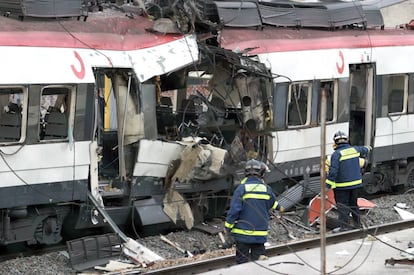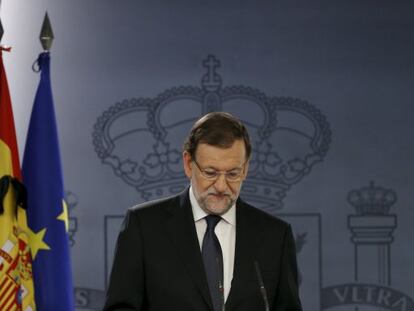Spain: the EU country where 21st-century terrorism has hit hardest
Unprecedented study charts map of terror in a bid to develop pan-European legislation to help victims

Every time a terrorist attack is committed, there is ample media coverage of the attacker¡¯s personality, background and motives. But the victims often don¡¯t get quite as much attention. In order to redress this situation, Maite Pagazaurtund¨²a ¨C a member of the European Parliament whose own family was a victim of the Basque terrorist group ETA for many years ¨C has endorsed an unprecedented study that identifies the 658 victims of terrorism in the European Union in the 21st century, as well as the 1,029 Europeans who were murdered outside the EU.

Pagazaurtund¨²a, who is a Member of the European Parliament for the small progressive party Union, Progress and Democracy (UPyD) and former president of the Victims of Terrorism Foundation, on Friday presented a study that finds that Spain heads the list of EU nations with the biggest death toll from terrorism: 253.
This is mostly due to the sheer magnitude of the Atocha train bombings of March 11, 2004, although the last fatality dates to 2009, when ETA killed a policeman in a bomb attack.
The mentality is, think like us, stay quiet or die
Maite Pagazaurtundua, MEP
The year-long research work lists the date, place, name and gender of every victim, along with the type of weapon used in the attack. The team that worked on the project will now offer it to the European Commission.
After Spain, France has the second-highest death toll at 250; most of these killings have occurred over the last two years, in the wake of the Islamist attacks against the satirical publication Charlie Hebdo and the Bataclan nightclub.
They are followed by Britain with 53 deaths, Belgium with 36 and Germany with 24. Only four EU member states have never experienced terrorist attacks on their soil in the last 17 years: Luxembourg, Austria, Malta and Slovenia.
In an increasingly globalized world, 107 of the 658 victims of terrorist attacks on EU territory in the 21st century were not European citizens (in seven cases, the nationality is not known). Another 1,029 Europeans were murdered in 12 non-EU countries. This category includes 632 individuals, mostly from the military, who died in Afghanistan.
A victim herself
Maite Pagazaurtund¨²a¡¯s brother Joseba was assassinated by ETA in 2003 after years of threats by the Basque terrorist group and its supporters. She herself suffered constant harassment and had bodyguards for years. Ultimately, security forces urged her to leave her native Basque Country because of the high risk of assassination, and she settled down elsewhere in Spain along with her family. Pagazaurtund¨²a¡¯s continuous activism in favor of terrorism victims earned her a spot on a collective candidacy to the 2005 Nobel Peace Prize.
Pagazaurtund¨²a admitted that this last point is debatable, but said that ¡°the line between terrorism and asymmetric warfare has become blurred,¡± and that today¡¯s conflicts ¡°cannot be analyzed with another century¡¯s parameters.¡±
Another fact to emerge from the study is that jihadism has become the number-one cause of deaths from terrorism: 82.6% of victims died in Islamist attacks.
The early years of the 21st century have also been witness to the dying blows of homegrown forms of terrorism in Europe, chiefly in the Basque Country and Ireland. Meanwhile, far-right militants killed 12 people while those from the far left assassinated another nine.
There is so much left to do on this subject in the EU
Sonia Ramos, head of Spain¡¯s terrorism victim support agency
Although these forms of terrorism have opposing ideologies, they all share a common totalitarian mentality, said Pagazaurtund¨²a, who summed it up in one sentence: ¡°Think like us, stay quiet or die.¡± The Basque MEP speaks from personal experience, having been subjected to this form of pressure herself (see sidebar).
Besides the quantitative work contained in The Black Book of Terrorism in Europe, there is also an analytical section with contributions by experts such as the Basque philosopher Fernando Savater, the researcher Fernando Reinares, the mayor of Mechelen (Belgium), Bart Sommers, and Dounia Bouzar, founder of the French radicalization prevention center CPDSI, among others.
Besides its academic value, the sponsors of this project hope to raise awareness at the European level about the need to protect the victims of terrorism. Right now, only three countries have specific legislation on this issue (Spain, France and Italy), and there is no EU directive to ensure that all Europeans are guaranteed the same rights.
¡°There is so much left to do on this subject in the EU,¡± said Sonia Ramos, head of Spain¡¯s terrorism victim support agency. But this new study is ¡°a great step forward.¡±
English version by Susana Urra.
Tu suscripci¨®n se est¨¢ usando en otro dispositivo
?Quieres a?adir otro usuario a tu suscripci¨®n?
Si contin¨²as leyendo en este dispositivo, no se podr¨¢ leer en el otro.
FlechaTu suscripci¨®n se est¨¢ usando en otro dispositivo y solo puedes acceder a EL PA?S desde un dispositivo a la vez.
Si quieres compartir tu cuenta, cambia tu suscripci¨®n a la modalidad Premium, as¨ª podr¨¢s a?adir otro usuario. Cada uno acceder¨¢ con su propia cuenta de email, lo que os permitir¨¢ personalizar vuestra experiencia en EL PA?S.
?Tienes una suscripci¨®n de empresa? Accede aqu¨ª para contratar m¨¢s cuentas.
En el caso de no saber qui¨¦n est¨¢ usando tu cuenta, te recomendamos cambiar tu contrase?a aqu¨ª.
Si decides continuar compartiendo tu cuenta, este mensaje se mostrar¨¢ en tu dispositivo y en el de la otra persona que est¨¢ usando tu cuenta de forma indefinida, afectando a tu experiencia de lectura. Puedes consultar aqu¨ª los t¨¦rminos y condiciones de la suscripci¨®n digital.










































